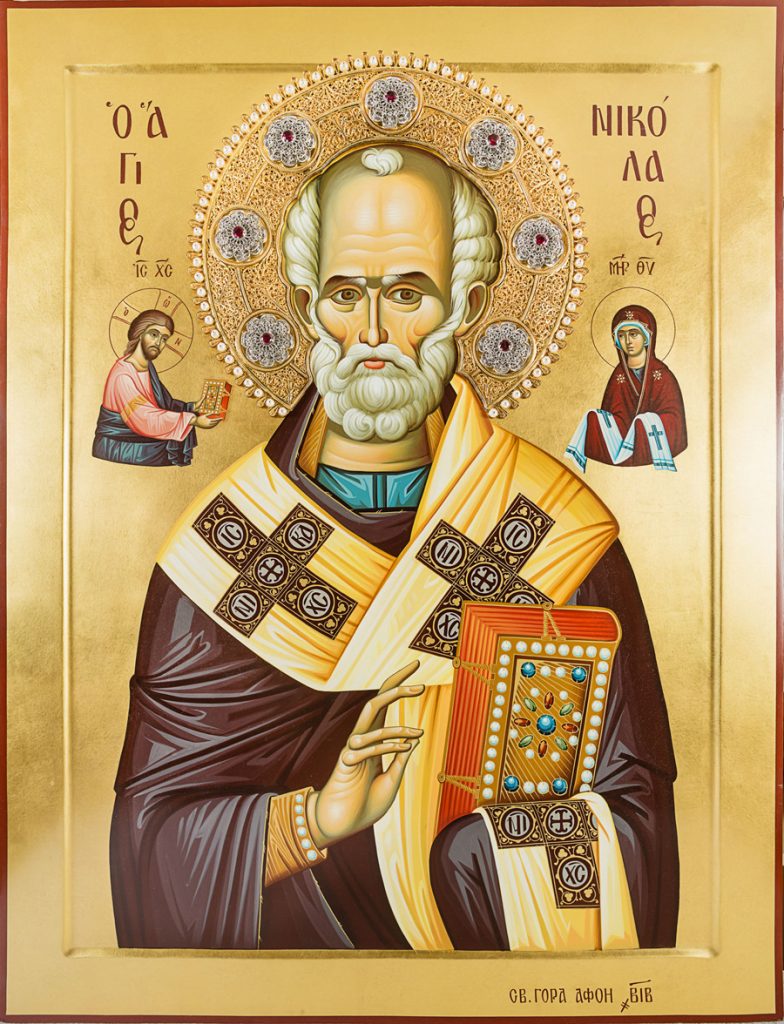 On the icons of St. Nicholas, the Lord Savior is usually depicted on one side with a Gospel in His hands and, on the other side, the Most Holy Virgin, the Theotokos, with an episcopal omophor on her hands. This has a two-fold historical significance, and in the first instance, this signifies the calling of Nicholas to the Hierarchical office and in the second instance, his justification from the punishment because of the confrontation with Arius.
On the icons of St. Nicholas, the Lord Savior is usually depicted on one side with a Gospel in His hands and, on the other side, the Most Holy Virgin, the Theotokos, with an episcopal omophor on her hands. This has a two-fold historical significance, and in the first instance, this signifies the calling of Nicholas to the Hierarchical office and in the second instance, his justification from the punishment because of the confrontation with Arius.
 St. Methodius, the Patriarch of Constantinople writes: “One night, St. Nicholas saw our Savior in glory standing by him and extending to him the Gospel, adorned with gold and pearls and, on the other side, he saw the Theotokos who was placing the episcopal pallium [omophorion] on his shoulders.” Shortly after this vision John, the Archbishop of Myra, died and St. Nicholas was appointed as archbishop of that city. That was the first incident. The second incident occurred at the time of the First Ecumenical Council in Nicaea. Unable to stop Arius of the irrational blasphemy of the Son of God and His Most Holy Mother by reason, St. Nicholas struck Arius on the face with his hand. The holy fathers at the Council, protesting such action banned Nicholas from the Council and deprived him of all his episcopal signs. That same night, several of the holy fathers saw an identical vision, namely, how the Lord Savior and the Most Holy Theotokos standing around St. Nicholas; on one side the Lord Savior with the Gospel and, on the other side, the Most Holy Theotokos with a pallium extending to the saint the marks of his episcopacy which had been removed from him. Seeing this, the fathers were awe-struck and quickly returned to Nicholas that which had been taken away and began to respect him as a great chosen one of God and his actions against Arius, they interpreted, not as an act of unreasonable anger, but rather an expression of great zeal for God’s truth.
St. Methodius, the Patriarch of Constantinople writes: “One night, St. Nicholas saw our Savior in glory standing by him and extending to him the Gospel, adorned with gold and pearls and, on the other side, he saw the Theotokos who was placing the episcopal pallium [omophorion] on his shoulders.” Shortly after this vision John, the Archbishop of Myra, died and St. Nicholas was appointed as archbishop of that city. That was the first incident. The second incident occurred at the time of the First Ecumenical Council in Nicaea. Unable to stop Arius of the irrational blasphemy of the Son of God and His Most Holy Mother by reason, St. Nicholas struck Arius on the face with his hand. The holy fathers at the Council, protesting such action banned Nicholas from the Council and deprived him of all his episcopal signs. That same night, several of the holy fathers saw an identical vision, namely, how the Lord Savior and the Most Holy Theotokos standing around St. Nicholas; on one side the Lord Savior with the Gospel and, on the other side, the Most Holy Theotokos with a pallium extending to the saint the marks of his episcopacy which had been removed from him. Seeing this, the fathers were awe-struck and quickly returned to Nicholas that which had been taken away and began to respect him as a great chosen one of God and his actions against Arius, they interpreted, not as an act of unreasonable anger, but rather an expression of great zeal for God’s truth.
Prolog of Ohrid By Bishop NIKOLAI VELIMIROVCH
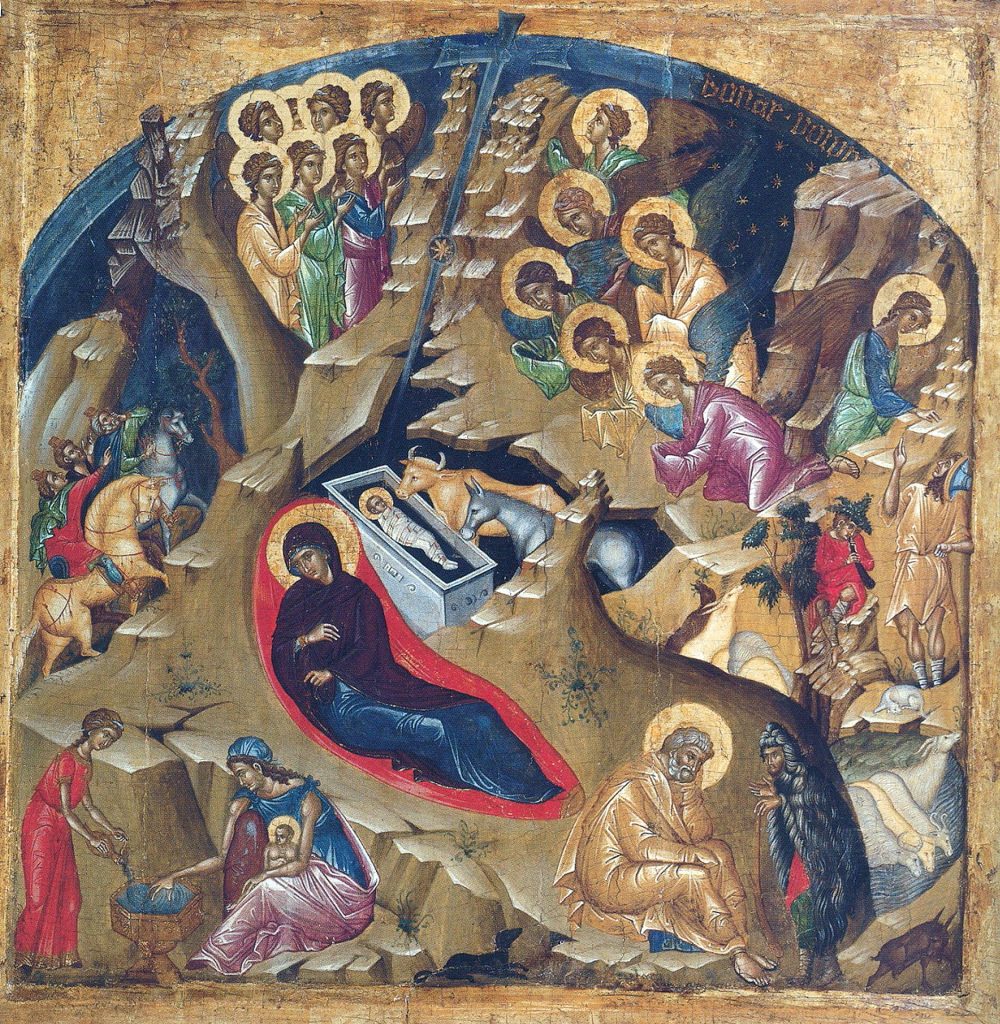 Glory to Thee O Lord! Yet again have we have reached the bright days of the Nativity of Christ! This feast is one of the great twelve feasts—it has five days of forefeast and six days of afterfeast, and in the divine service books it is called the three-day Pascha.
Glory to Thee O Lord! Yet again have we have reached the bright days of the Nativity of Christ! This feast is one of the great twelve feasts—it has five days of forefeast and six days of afterfeast, and in the divine service books it is called the three-day Pascha.

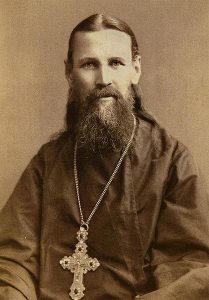 Our life is child’s play, only not innocent, but sinful, because, with a strong mind, and with the knowledge of the purpose of our life, we neglect this purpose and occupy ourselves with frivolous, purposeless matters. And thus our life is childish, unpardonable play.
Our life is child’s play, only not innocent, but sinful, because, with a strong mind, and with the knowledge of the purpose of our life, we neglect this purpose and occupy ourselves with frivolous, purposeless matters. And thus our life is childish, unpardonable play.
 On the icons of St. Nicholas, the Lord Savior is usually depicted on one side with a Gospel in His hands and, on the other side, the Most Holy Virgin, the Theotokos, with an episcopal omophor on her hands. This has a two-fold historical significance, and in the first instance, this signifies the calling of Nicholas to the Hierarchical office and in the second instance, his justification from the punishment because of the confrontation with Arius.
On the icons of St. Nicholas, the Lord Savior is usually depicted on one side with a Gospel in His hands and, on the other side, the Most Holy Virgin, the Theotokos, with an episcopal omophor on her hands. This has a two-fold historical significance, and in the first instance, this signifies the calling of Nicholas to the Hierarchical office and in the second instance, his justification from the punishment because of the confrontation with Arius.  St. Methodius, the Patriarch of Constantinople writes: “One night, St. Nicholas saw our Savior in glory standing by him and extending to him the Gospel, adorned with gold and pearls and, on the other side, he saw the Theotokos who was placing the episcopal pallium [omophorion] on his shoulders.” Shortly after this vision John, the Archbishop of Myra, died and St. Nicholas was appointed as archbishop of that city. That was the first incident. The second incident occurred at the time of the First Ecumenical Council in Nicaea. Unable to stop Arius of the irrational blasphemy of the Son of God and His Most Holy Mother by reason, St. Nicholas struck Arius on the face with his hand. The holy fathers at the Council, protesting such action banned Nicholas from the Council and deprived him of all his episcopal signs. That same night, several of the holy fathers saw an identical vision, namely, how the Lord Savior and the Most Holy Theotokos standing around St. Nicholas; on one side the Lord Savior with the Gospel and, on the other side, the Most Holy Theotokos with a pallium extending to the saint the marks of his episcopacy which had been removed from him. Seeing this, the fathers were awe-struck and quickly returned to Nicholas that which had been taken away and began to respect him as a great chosen one of God and his actions against Arius, they interpreted, not as an act of unreasonable anger, but rather an expression of great zeal for God’s truth.
St. Methodius, the Patriarch of Constantinople writes: “One night, St. Nicholas saw our Savior in glory standing by him and extending to him the Gospel, adorned with gold and pearls and, on the other side, he saw the Theotokos who was placing the episcopal pallium [omophorion] on his shoulders.” Shortly after this vision John, the Archbishop of Myra, died and St. Nicholas was appointed as archbishop of that city. That was the first incident. The second incident occurred at the time of the First Ecumenical Council in Nicaea. Unable to stop Arius of the irrational blasphemy of the Son of God and His Most Holy Mother by reason, St. Nicholas struck Arius on the face with his hand. The holy fathers at the Council, protesting such action banned Nicholas from the Council and deprived him of all his episcopal signs. That same night, several of the holy fathers saw an identical vision, namely, how the Lord Savior and the Most Holy Theotokos standing around St. Nicholas; on one side the Lord Savior with the Gospel and, on the other side, the Most Holy Theotokos with a pallium extending to the saint the marks of his episcopacy which had been removed from him. Seeing this, the fathers were awe-struck and quickly returned to Nicholas that which had been taken away and began to respect him as a great chosen one of God and his actions against Arius, they interpreted, not as an act of unreasonable anger, but rather an expression of great zeal for God’s truth.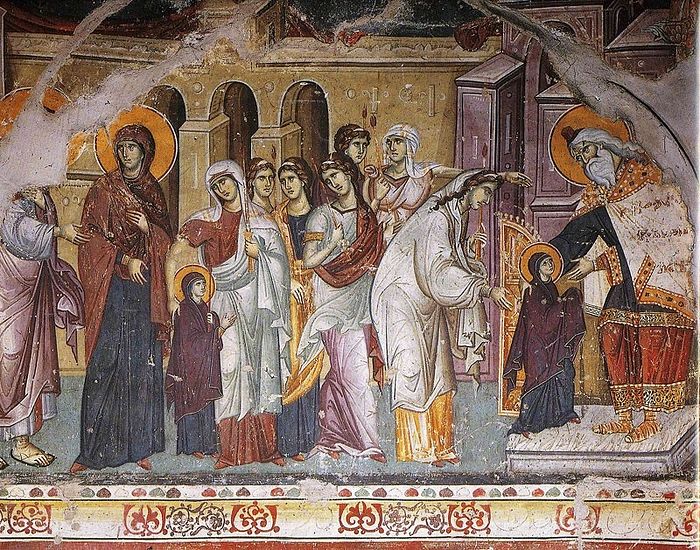 In the name of the Father and of the Son and of the Holy Spirit!
In the name of the Father and of the Son and of the Holy Spirit!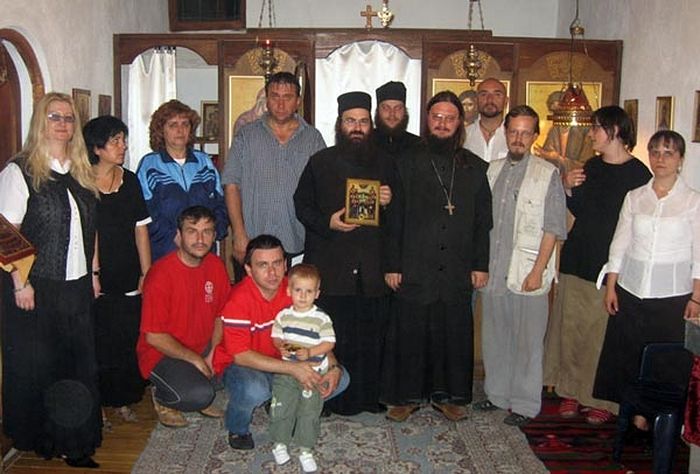
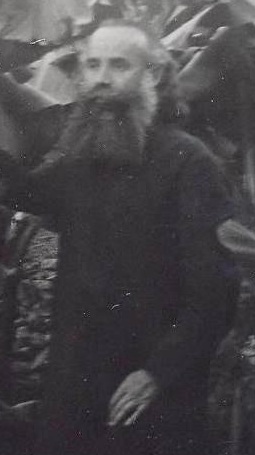 Who would not be astonished to know in depth the life of this holy hierarch, this great servant of God? Like a new disciple of Saint Demetrios, during times of persecution, he did not hide his faith in Christ, but revealed and preached the name of our Lord and Saviour wherever he went.
Who would not be astonished to know in depth the life of this holy hierarch, this great servant of God? Like a new disciple of Saint Demetrios, during times of persecution, he did not hide his faith in Christ, but revealed and preached the name of our Lord and Saviour wherever he went. 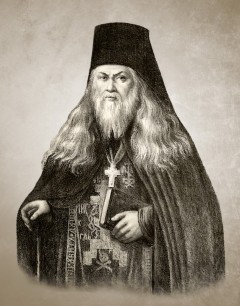
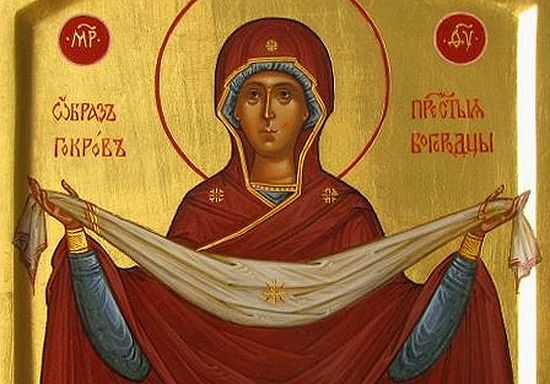 The spiritual protection and intercession before God, which we receive according to the great mercy and love that the Mother of God has for us, do we hymn today. For from the time that the Divine Sufferer and Savior of the world willed to give to the Mother of God as an adopted child the human race in the person of His disciple, St. John the Theologian, this protection has not ceased for a single day; and throughout all times and human history it has been this way—Mother and child! Penetrate these words with your thought; think upon their great depth of meaning, and on the most sacred kinship, purer and holier than which there is none on earth.Woman, behold thy son! (Jn. 19:26) is heard from the lips of the Divine Sufferer. And what do these words mean?!
The spiritual protection and intercession before God, which we receive according to the great mercy and love that the Mother of God has for us, do we hymn today. For from the time that the Divine Sufferer and Savior of the world willed to give to the Mother of God as an adopted child the human race in the person of His disciple, St. John the Theologian, this protection has not ceased for a single day; and throughout all times and human history it has been this way—Mother and child! Penetrate these words with your thought; think upon their great depth of meaning, and on the most sacred kinship, purer and holier than which there is none on earth.Woman, behold thy son! (Jn. 19:26) is heard from the lips of the Divine Sufferer. And what do these words mean?!